Skills for Higher Education: An Overview of Academic Writing Features
VerifiedAdded on 2023/06/18
|6
|1994
|453
Essay
AI Summary
This essay delves into the essential features of academic writing crucial for success in higher education. It highlights seven key elements: structure, evidence, critical analysis, balance, precision, objectivity, and formality. Each feature is explored in detail, emphasizing its importance in creating credible, authentic, and easily understandable written work. The essay explains how structure provides a logical flow, evidence adds credibility, critical analysis encourages deeper thinking, balance ensures fairness, precision enhances clarity, objectivity prevents bias, and formality maintains professionalism. By incorporating these features, academic writing becomes cohesive, succinct, and reliable, enabling effective communication and fostering a deeper understanding of the subject matter for both the writer and the reader. Desklib provides a platform where students can access similar solved assignments and study resources to enhance their academic skills.
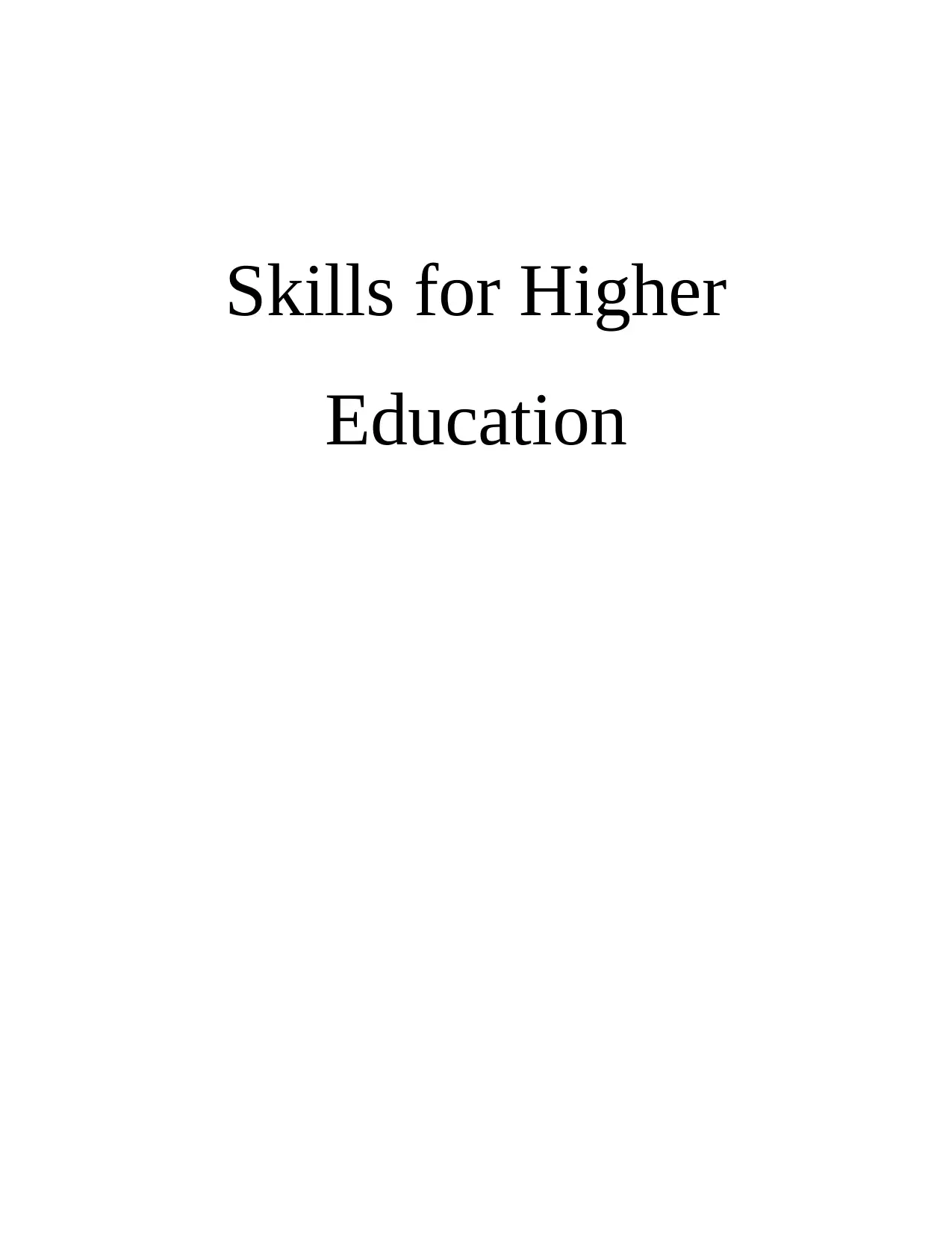
Skills for Higher
Education
Education
Paraphrase This Document
Need a fresh take? Get an instant paraphrase of this document with our AI Paraphraser
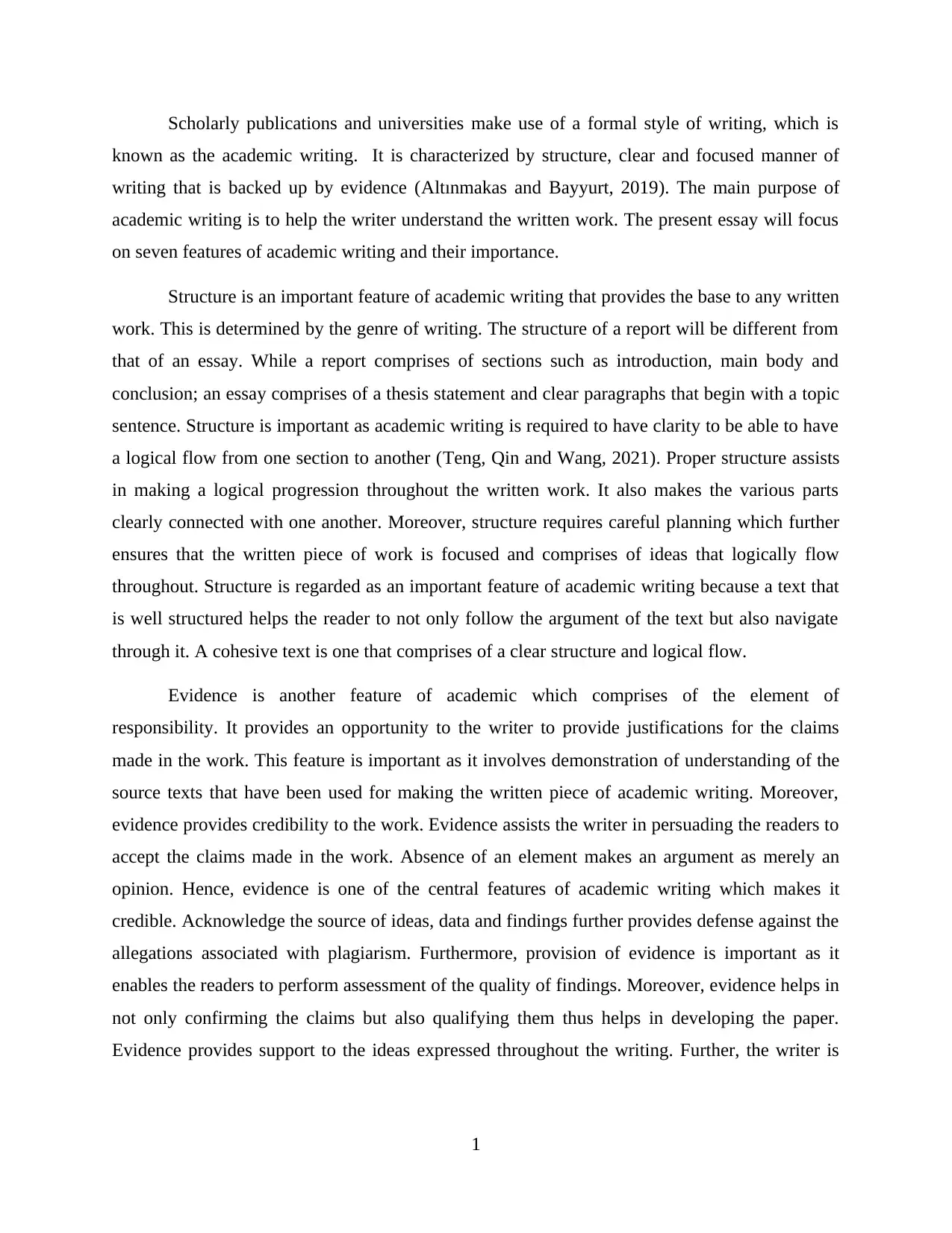
Scholarly publications and universities make use of a formal style of writing, which is
known as the academic writing. It is characterized by structure, clear and focused manner of
writing that is backed up by evidence (Altınmakas and Bayyurt, 2019). The main purpose of
academic writing is to help the writer understand the written work. The present essay will focus
on seven features of academic writing and their importance.
Structure is an important feature of academic writing that provides the base to any written
work. This is determined by the genre of writing. The structure of a report will be different from
that of an essay. While a report comprises of sections such as introduction, main body and
conclusion; an essay comprises of a thesis statement and clear paragraphs that begin with a topic
sentence. Structure is important as academic writing is required to have clarity to be able to have
a logical flow from one section to another (Teng, Qin and Wang, 2021). Proper structure assists
in making a logical progression throughout the written work. It also makes the various parts
clearly connected with one another. Moreover, structure requires careful planning which further
ensures that the written piece of work is focused and comprises of ideas that logically flow
throughout. Structure is regarded as an important feature of academic writing because a text that
is well structured helps the reader to not only follow the argument of the text but also navigate
through it. A cohesive text is one that comprises of a clear structure and logical flow.
Evidence is another feature of academic which comprises of the element of
responsibility. It provides an opportunity to the writer to provide justifications for the claims
made in the work. This feature is important as it involves demonstration of understanding of the
source texts that have been used for making the written piece of academic writing. Moreover,
evidence provides credibility to the work. Evidence assists the writer in persuading the readers to
accept the claims made in the work. Absence of an element makes an argument as merely an
opinion. Hence, evidence is one of the central features of academic writing which makes it
credible. Acknowledge the source of ideas, data and findings further provides defense against the
allegations associated with plagiarism. Furthermore, provision of evidence is important as it
enables the readers to perform assessment of the quality of findings. Moreover, evidence helps in
not only confirming the claims but also qualifying them thus helps in developing the paper.
Evidence provides support to the ideas expressed throughout the writing. Further, the writer is
1
known as the academic writing. It is characterized by structure, clear and focused manner of
writing that is backed up by evidence (Altınmakas and Bayyurt, 2019). The main purpose of
academic writing is to help the writer understand the written work. The present essay will focus
on seven features of academic writing and their importance.
Structure is an important feature of academic writing that provides the base to any written
work. This is determined by the genre of writing. The structure of a report will be different from
that of an essay. While a report comprises of sections such as introduction, main body and
conclusion; an essay comprises of a thesis statement and clear paragraphs that begin with a topic
sentence. Structure is important as academic writing is required to have clarity to be able to have
a logical flow from one section to another (Teng, Qin and Wang, 2021). Proper structure assists
in making a logical progression throughout the written work. It also makes the various parts
clearly connected with one another. Moreover, structure requires careful planning which further
ensures that the written piece of work is focused and comprises of ideas that logically flow
throughout. Structure is regarded as an important feature of academic writing because a text that
is well structured helps the reader to not only follow the argument of the text but also navigate
through it. A cohesive text is one that comprises of a clear structure and logical flow.
Evidence is another feature of academic which comprises of the element of
responsibility. It provides an opportunity to the writer to provide justifications for the claims
made in the work. This feature is important as it involves demonstration of understanding of the
source texts that have been used for making the written piece of academic writing. Moreover,
evidence provides credibility to the work. Evidence assists the writer in persuading the readers to
accept the claims made in the work. Absence of an element makes an argument as merely an
opinion. Hence, evidence is one of the central features of academic writing which makes it
credible. Acknowledge the source of ideas, data and findings further provides defense against the
allegations associated with plagiarism. Furthermore, provision of evidence is important as it
enables the readers to perform assessment of the quality of findings. Moreover, evidence helps in
not only confirming the claims but also qualifying them thus helps in developing the paper.
Evidence provides support to the ideas expressed throughout the writing. Further, the writer is
1
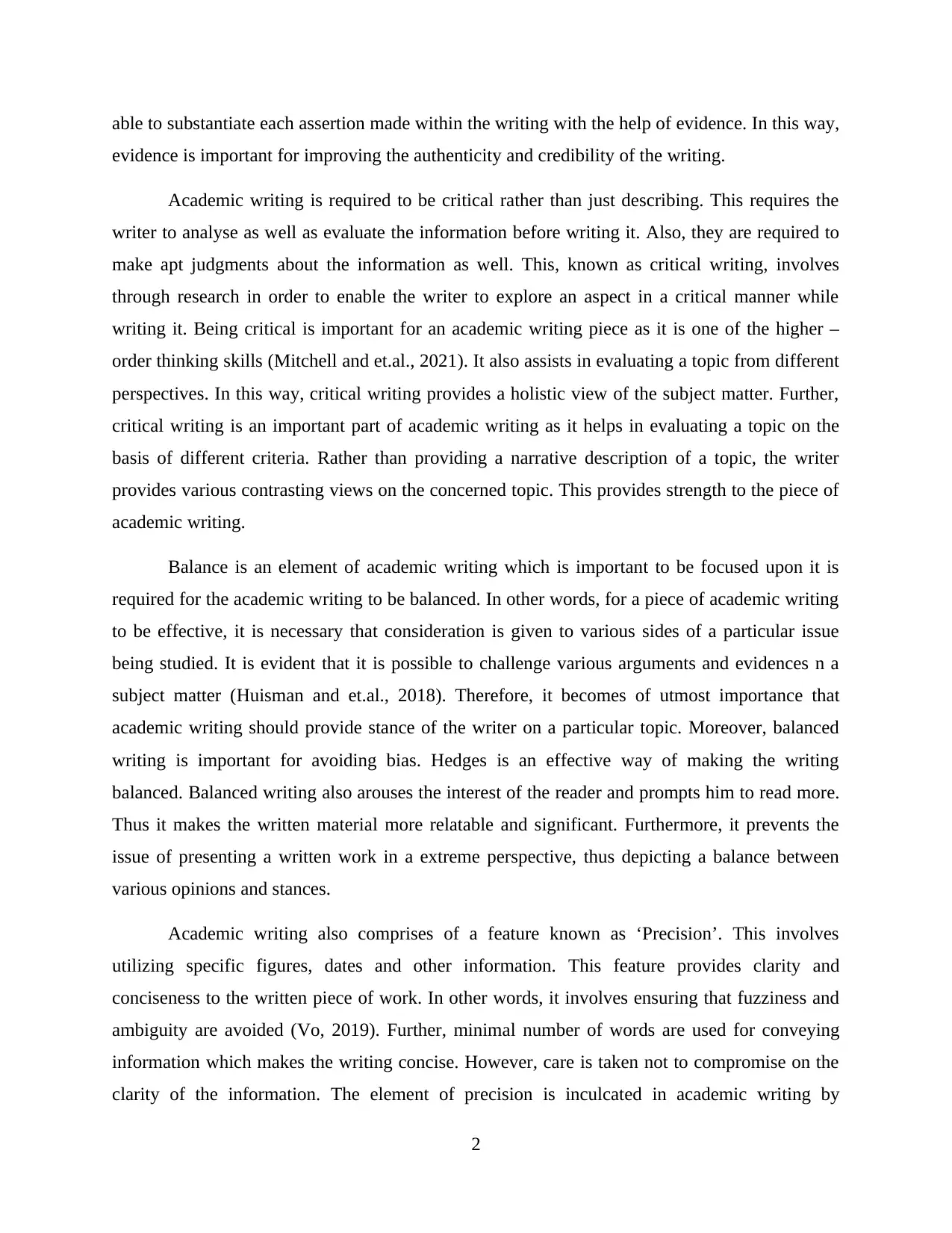
able to substantiate each assertion made within the writing with the help of evidence. In this way,
evidence is important for improving the authenticity and credibility of the writing.
Academic writing is required to be critical rather than just describing. This requires the
writer to analyse as well as evaluate the information before writing it. Also, they are required to
make apt judgments about the information as well. This, known as critical writing, involves
through research in order to enable the writer to explore an aspect in a critical manner while
writing it. Being critical is important for an academic writing piece as it is one of the higher –
order thinking skills (Mitchell and et.al., 2021). It also assists in evaluating a topic from different
perspectives. In this way, critical writing provides a holistic view of the subject matter. Further,
critical writing is an important part of academic writing as it helps in evaluating a topic on the
basis of different criteria. Rather than providing a narrative description of a topic, the writer
provides various contrasting views on the concerned topic. This provides strength to the piece of
academic writing.
Balance is an element of academic writing which is important to be focused upon it is
required for the academic writing to be balanced. In other words, for a piece of academic writing
to be effective, it is necessary that consideration is given to various sides of a particular issue
being studied. It is evident that it is possible to challenge various arguments and evidences n a
subject matter (Huisman and et.al., 2018). Therefore, it becomes of utmost importance that
academic writing should provide stance of the writer on a particular topic. Moreover, balanced
writing is important for avoiding bias. Hedges is an effective way of making the writing
balanced. Balanced writing also arouses the interest of the reader and prompts him to read more.
Thus it makes the written material more relatable and significant. Furthermore, it prevents the
issue of presenting a written work in a extreme perspective, thus depicting a balance between
various opinions and stances.
Academic writing also comprises of a feature known as ‘Precision’. This involves
utilizing specific figures, dates and other information. This feature provides clarity and
conciseness to the written piece of work. In other words, it involves ensuring that fuzziness and
ambiguity are avoided (Vo, 2019). Further, minimal number of words are used for conveying
information which makes the writing concise. However, care is taken not to compromise on the
clarity of the information. The element of precision is inculcated in academic writing by
2
evidence is important for improving the authenticity and credibility of the writing.
Academic writing is required to be critical rather than just describing. This requires the
writer to analyse as well as evaluate the information before writing it. Also, they are required to
make apt judgments about the information as well. This, known as critical writing, involves
through research in order to enable the writer to explore an aspect in a critical manner while
writing it. Being critical is important for an academic writing piece as it is one of the higher –
order thinking skills (Mitchell and et.al., 2021). It also assists in evaluating a topic from different
perspectives. In this way, critical writing provides a holistic view of the subject matter. Further,
critical writing is an important part of academic writing as it helps in evaluating a topic on the
basis of different criteria. Rather than providing a narrative description of a topic, the writer
provides various contrasting views on the concerned topic. This provides strength to the piece of
academic writing.
Balance is an element of academic writing which is important to be focused upon it is
required for the academic writing to be balanced. In other words, for a piece of academic writing
to be effective, it is necessary that consideration is given to various sides of a particular issue
being studied. It is evident that it is possible to challenge various arguments and evidences n a
subject matter (Huisman and et.al., 2018). Therefore, it becomes of utmost importance that
academic writing should provide stance of the writer on a particular topic. Moreover, balanced
writing is important for avoiding bias. Hedges is an effective way of making the writing
balanced. Balanced writing also arouses the interest of the reader and prompts him to read more.
Thus it makes the written material more relatable and significant. Furthermore, it prevents the
issue of presenting a written work in a extreme perspective, thus depicting a balance between
various opinions and stances.
Academic writing also comprises of a feature known as ‘Precision’. This involves
utilizing specific figures, dates and other information. This feature provides clarity and
conciseness to the written piece of work. In other words, it involves ensuring that fuzziness and
ambiguity are avoided (Vo, 2019). Further, minimal number of words are used for conveying
information which makes the writing concise. However, care is taken not to compromise on the
clarity of the information. The element of precision is inculcated in academic writing by
2
⊘ This is a preview!⊘
Do you want full access?
Subscribe today to unlock all pages.

Trusted by 1+ million students worldwide
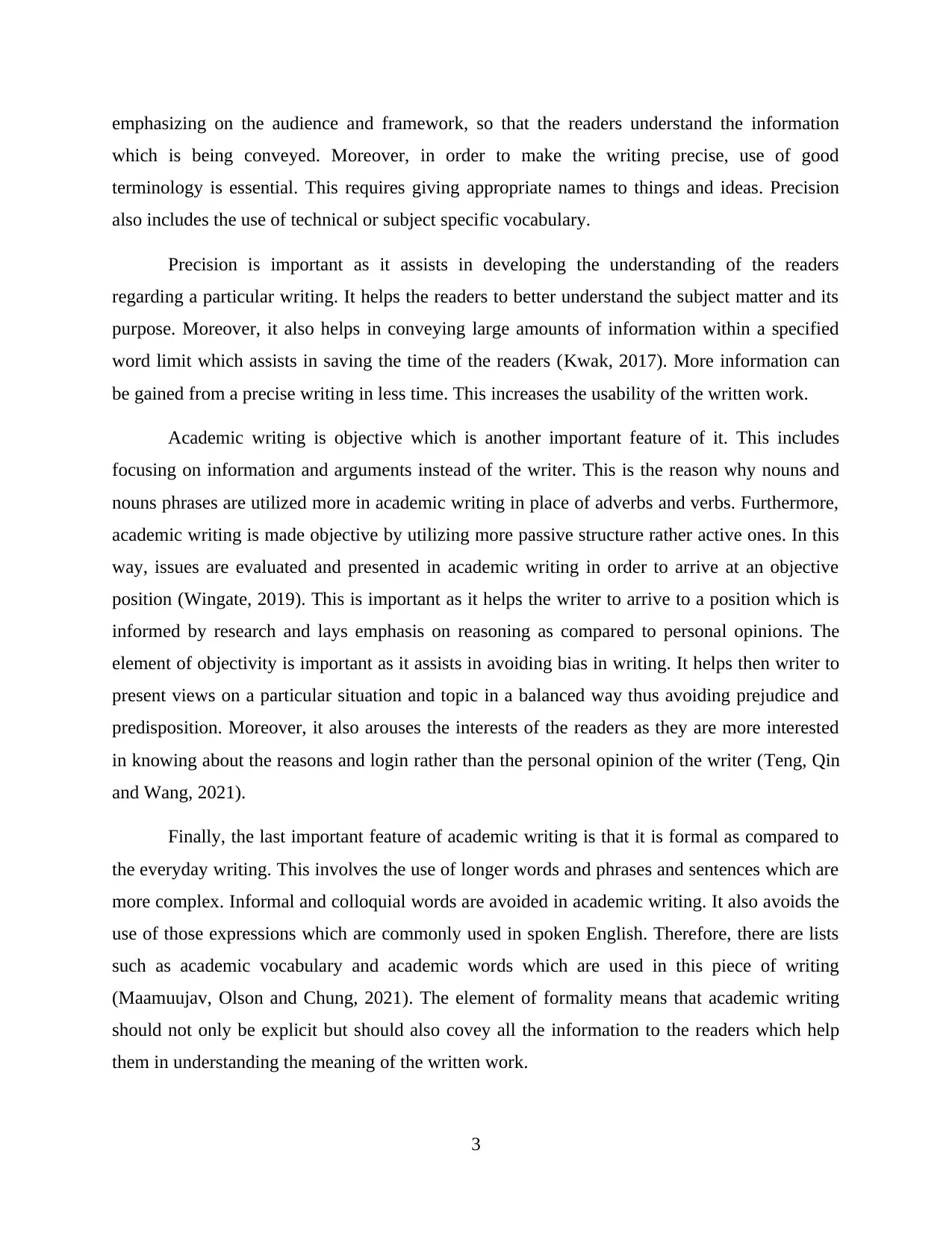
emphasizing on the audience and framework, so that the readers understand the information
which is being conveyed. Moreover, in order to make the writing precise, use of good
terminology is essential. This requires giving appropriate names to things and ideas. Precision
also includes the use of technical or subject specific vocabulary.
Precision is important as it assists in developing the understanding of the readers
regarding a particular writing. It helps the readers to better understand the subject matter and its
purpose. Moreover, it also helps in conveying large amounts of information within a specified
word limit which assists in saving the time of the readers (Kwak, 2017). More information can
be gained from a precise writing in less time. This increases the usability of the written work.
Academic writing is objective which is another important feature of it. This includes
focusing on information and arguments instead of the writer. This is the reason why nouns and
nouns phrases are utilized more in academic writing in place of adverbs and verbs. Furthermore,
academic writing is made objective by utilizing more passive structure rather active ones. In this
way, issues are evaluated and presented in academic writing in order to arrive at an objective
position (Wingate, 2019). This is important as it helps the writer to arrive to a position which is
informed by research and lays emphasis on reasoning as compared to personal opinions. The
element of objectivity is important as it assists in avoiding bias in writing. It helps then writer to
present views on a particular situation and topic in a balanced way thus avoiding prejudice and
predisposition. Moreover, it also arouses the interests of the readers as they are more interested
in knowing about the reasons and login rather than the personal opinion of the writer (Teng, Qin
and Wang, 2021).
Finally, the last important feature of academic writing is that it is formal as compared to
the everyday writing. This involves the use of longer words and phrases and sentences which are
more complex. Informal and colloquial words are avoided in academic writing. It also avoids the
use of those expressions which are commonly used in spoken English. Therefore, there are lists
such as academic vocabulary and academic words which are used in this piece of writing
(Maamuujav, Olson and Chung, 2021). The element of formality means that academic writing
should not only be explicit but should also covey all the information to the readers which help
them in understanding the meaning of the written work.
3
which is being conveyed. Moreover, in order to make the writing precise, use of good
terminology is essential. This requires giving appropriate names to things and ideas. Precision
also includes the use of technical or subject specific vocabulary.
Precision is important as it assists in developing the understanding of the readers
regarding a particular writing. It helps the readers to better understand the subject matter and its
purpose. Moreover, it also helps in conveying large amounts of information within a specified
word limit which assists in saving the time of the readers (Kwak, 2017). More information can
be gained from a precise writing in less time. This increases the usability of the written work.
Academic writing is objective which is another important feature of it. This includes
focusing on information and arguments instead of the writer. This is the reason why nouns and
nouns phrases are utilized more in academic writing in place of adverbs and verbs. Furthermore,
academic writing is made objective by utilizing more passive structure rather active ones. In this
way, issues are evaluated and presented in academic writing in order to arrive at an objective
position (Wingate, 2019). This is important as it helps the writer to arrive to a position which is
informed by research and lays emphasis on reasoning as compared to personal opinions. The
element of objectivity is important as it assists in avoiding bias in writing. It helps then writer to
present views on a particular situation and topic in a balanced way thus avoiding prejudice and
predisposition. Moreover, it also arouses the interests of the readers as they are more interested
in knowing about the reasons and login rather than the personal opinion of the writer (Teng, Qin
and Wang, 2021).
Finally, the last important feature of academic writing is that it is formal as compared to
the everyday writing. This involves the use of longer words and phrases and sentences which are
more complex. Informal and colloquial words are avoided in academic writing. It also avoids the
use of those expressions which are commonly used in spoken English. Therefore, there are lists
such as academic vocabulary and academic words which are used in this piece of writing
(Maamuujav, Olson and Chung, 2021). The element of formality means that academic writing
should not only be explicit but should also covey all the information to the readers which help
them in understanding the meaning of the written work.
3
Paraphrase This Document
Need a fresh take? Get an instant paraphrase of this document with our AI Paraphraser
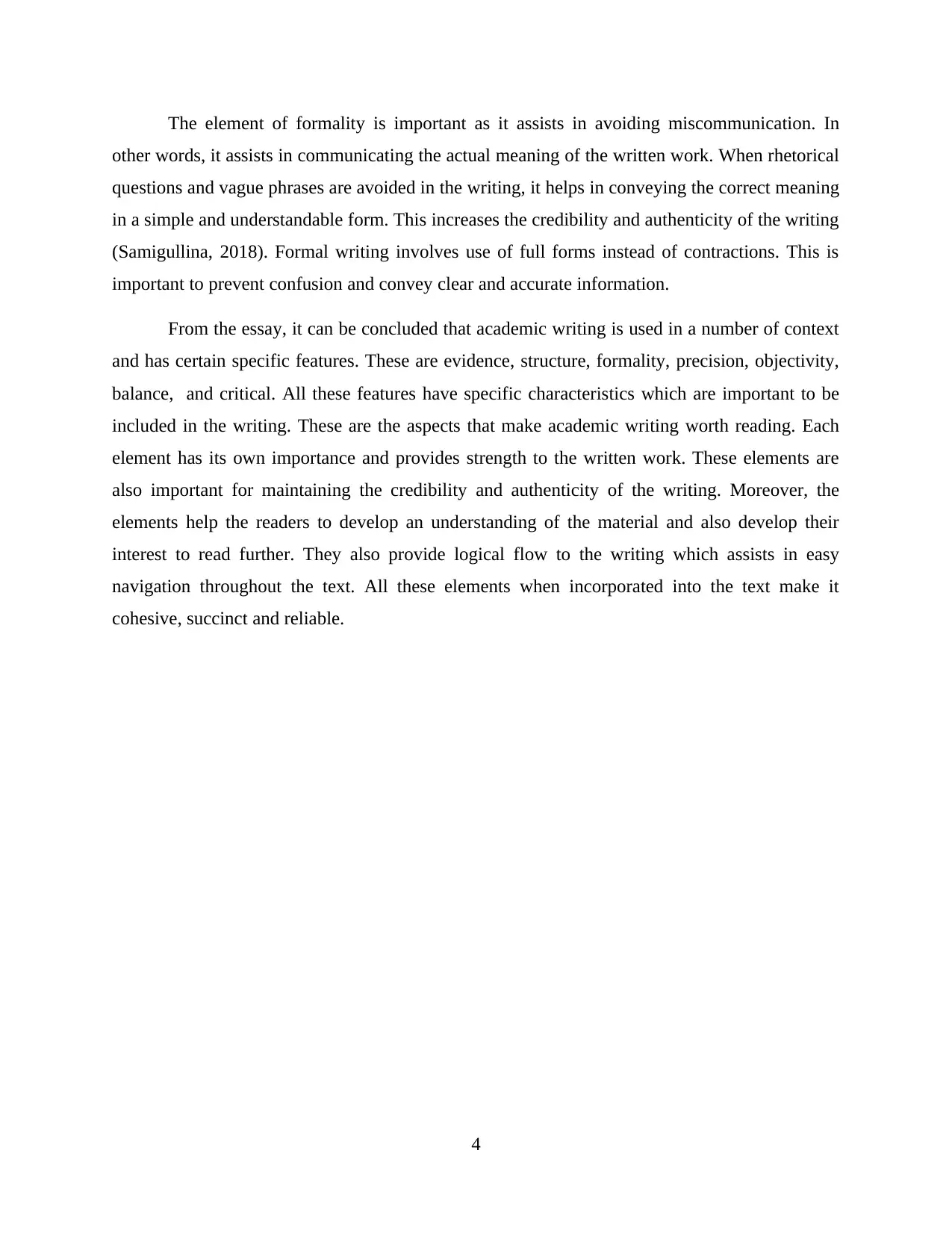
The element of formality is important as it assists in avoiding miscommunication. In
other words, it assists in communicating the actual meaning of the written work. When rhetorical
questions and vague phrases are avoided in the writing, it helps in conveying the correct meaning
in a simple and understandable form. This increases the credibility and authenticity of the writing
(Samigullina, 2018). Formal writing involves use of full forms instead of contractions. This is
important to prevent confusion and convey clear and accurate information.
From the essay, it can be concluded that academic writing is used in a number of context
and has certain specific features. These are evidence, structure, formality, precision, objectivity,
balance, and critical. All these features have specific characteristics which are important to be
included in the writing. These are the aspects that make academic writing worth reading. Each
element has its own importance and provides strength to the written work. These elements are
also important for maintaining the credibility and authenticity of the writing. Moreover, the
elements help the readers to develop an understanding of the material and also develop their
interest to read further. They also provide logical flow to the writing which assists in easy
navigation throughout the text. All these elements when incorporated into the text make it
cohesive, succinct and reliable.
4
other words, it assists in communicating the actual meaning of the written work. When rhetorical
questions and vague phrases are avoided in the writing, it helps in conveying the correct meaning
in a simple and understandable form. This increases the credibility and authenticity of the writing
(Samigullina, 2018). Formal writing involves use of full forms instead of contractions. This is
important to prevent confusion and convey clear and accurate information.
From the essay, it can be concluded that academic writing is used in a number of context
and has certain specific features. These are evidence, structure, formality, precision, objectivity,
balance, and critical. All these features have specific characteristics which are important to be
included in the writing. These are the aspects that make academic writing worth reading. Each
element has its own importance and provides strength to the written work. These elements are
also important for maintaining the credibility and authenticity of the writing. Moreover, the
elements help the readers to develop an understanding of the material and also develop their
interest to read further. They also provide logical flow to the writing which assists in easy
navigation throughout the text. All these elements when incorporated into the text make it
cohesive, succinct and reliable.
4
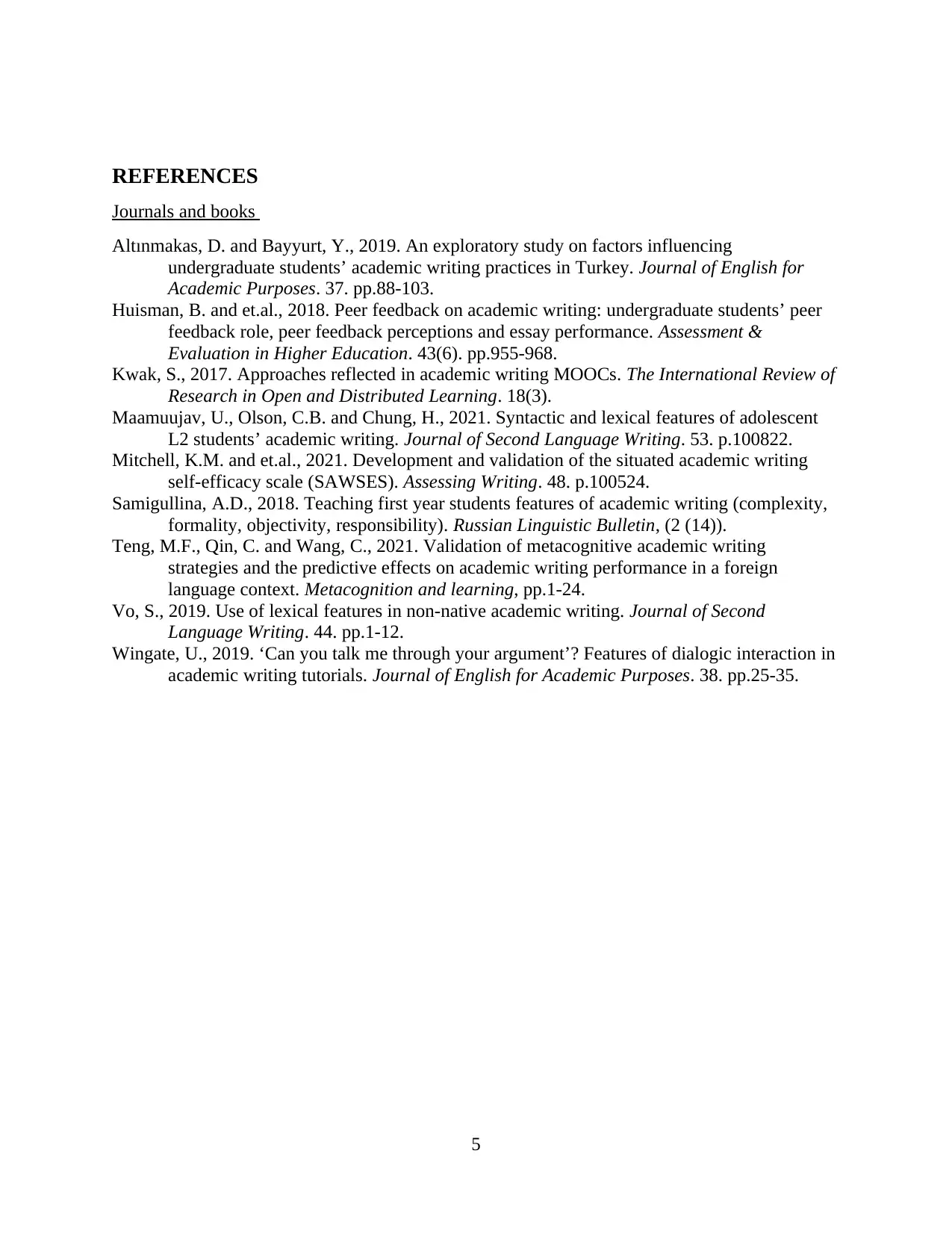
REFERENCES
Journals and books
Altınmakas, D. and Bayyurt, Y., 2019. An exploratory study on factors influencing
undergraduate students’ academic writing practices in Turkey. Journal of English for
Academic Purposes. 37. pp.88-103.
Huisman, B. and et.al., 2018. Peer feedback on academic writing: undergraduate students’ peer
feedback role, peer feedback perceptions and essay performance. Assessment &
Evaluation in Higher Education. 43(6). pp.955-968.
Kwak, S., 2017. Approaches reflected in academic writing MOOCs. The International Review of
Research in Open and Distributed Learning. 18(3).
Maamuujav, U., Olson, C.B. and Chung, H., 2021. Syntactic and lexical features of adolescent
L2 students’ academic writing. Journal of Second Language Writing. 53. p.100822.
Mitchell, K.M. and et.al., 2021. Development and validation of the situated academic writing
self-efficacy scale (SAWSES). Assessing Writing. 48. p.100524.
Samigullina, A.D., 2018. Teaching first year students features of academic writing (complexity,
formality, objectivity, responsibility). Russian Linguistic Bulletin, (2 (14)).
Teng, M.F., Qin, C. and Wang, C., 2021. Validation of metacognitive academic writing
strategies and the predictive effects on academic writing performance in a foreign
language context. Metacognition and learning, pp.1-24.
Vo, S., 2019. Use of lexical features in non-native academic writing. Journal of Second
Language Writing. 44. pp.1-12.
Wingate, U., 2019. ‘Can you talk me through your argument’? Features of dialogic interaction in
academic writing tutorials. Journal of English for Academic Purposes. 38. pp.25-35.
5
Journals and books
Altınmakas, D. and Bayyurt, Y., 2019. An exploratory study on factors influencing
undergraduate students’ academic writing practices in Turkey. Journal of English for
Academic Purposes. 37. pp.88-103.
Huisman, B. and et.al., 2018. Peer feedback on academic writing: undergraduate students’ peer
feedback role, peer feedback perceptions and essay performance. Assessment &
Evaluation in Higher Education. 43(6). pp.955-968.
Kwak, S., 2017. Approaches reflected in academic writing MOOCs. The International Review of
Research in Open and Distributed Learning. 18(3).
Maamuujav, U., Olson, C.B. and Chung, H., 2021. Syntactic and lexical features of adolescent
L2 students’ academic writing. Journal of Second Language Writing. 53. p.100822.
Mitchell, K.M. and et.al., 2021. Development and validation of the situated academic writing
self-efficacy scale (SAWSES). Assessing Writing. 48. p.100524.
Samigullina, A.D., 2018. Teaching first year students features of academic writing (complexity,
formality, objectivity, responsibility). Russian Linguistic Bulletin, (2 (14)).
Teng, M.F., Qin, C. and Wang, C., 2021. Validation of metacognitive academic writing
strategies and the predictive effects on academic writing performance in a foreign
language context. Metacognition and learning, pp.1-24.
Vo, S., 2019. Use of lexical features in non-native academic writing. Journal of Second
Language Writing. 44. pp.1-12.
Wingate, U., 2019. ‘Can you talk me through your argument’? Features of dialogic interaction in
academic writing tutorials. Journal of English for Academic Purposes. 38. pp.25-35.
5
⊘ This is a preview!⊘
Do you want full access?
Subscribe today to unlock all pages.

Trusted by 1+ million students worldwide
1 out of 6
Related Documents
Your All-in-One AI-Powered Toolkit for Academic Success.
+13062052269
info@desklib.com
Available 24*7 on WhatsApp / Email
![[object Object]](/_next/static/media/star-bottom.7253800d.svg)
Unlock your academic potential
Copyright © 2020–2025 A2Z Services. All Rights Reserved. Developed and managed by ZUCOL.


